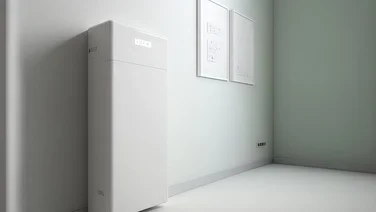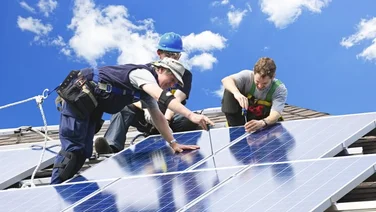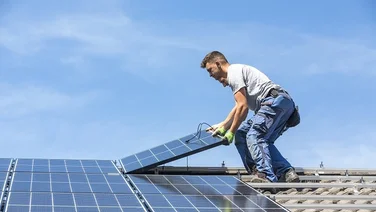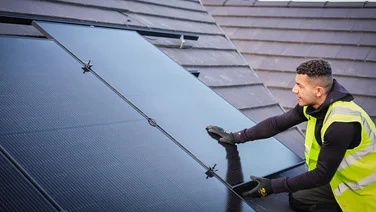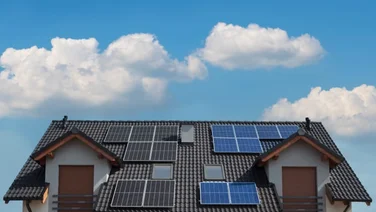We receive a small fee from trusted installers when you request a quote through our site. This helps us keep our content independent, well-researched and up to date – Learn more
- The average cost of solar panels in Scotland £7,191
- Solar panels can cut Scottish homes’ electricity bills by 62%, on average
- Homeowners can save up to £6,000 with Scotland Home Energy Loan
- CARES provides funding for solar project planning to community organisations
If you own a home in Scotland, installing and using solar panels could save huge on your bills.
But you might think solar panels aren’t worth getting in Scotland because it’s not sunny enough, but that’s far from true – you’ll still cut your electricity bills by more than half by getting your hands on some solar panels.
This might partly be because solar panel costs are coming down, but it’s also because the government has made it easier to get them through numerous solar panel grants.
We’ll walk you through all things solar panels in this article, including costs and savings, as well as the government grants and initiatives you can only find in Scotland.
Where do you want to install solar panels?
Get startedDo solar panels work in Scottish weather?
Solar panels do not require direct sunlight to generate electricity, which is great news given the weather of Scotland. While they produce more electricity when the sun is shining, they also work effectively on cloudy days.
In fact, a study from the University of Edinburgh in 2026, the average energy output of a domestic installation in Edinburgh is 10.6 kWh/day, which is only 13% less than London, at 12.2 kWh/day.
Another study by WWF Scotland found that since 2017, homes with solar panels have generated more than 100% of typical household electricity needs in seven different cities, including Edinburgh, Glasgow, and Dundee.
For instance, a summer heatwave in 2018 broke Scottish solar power records in multiple places. Solar panels provided Aberdeen with 136% of its average household electricity demand and provided Lerwick with 117%.
While they produce more electricity when the sun is shining, solar panels also work on cloudy days. They don’t require direct sunlight to generate electricity, which is great news given the weather of Scotland and the UK as a whole.
What are the advantages of buying solar panels in Scotland?
- They can save more than £600 on your energy bills
The average three-bedroom home in Scotland can save £660 per year with solar panels and cut their electricity bills by 62%.
So, whether you have solar panels in Edinburgh, Glasgow, or the Highlands, they’re more than worth it in Scotland.
You can power half of your home’s electricity with solar panels, allowing you to sell the remaining solar energy to the grid through the Smart Export Guarantee.
Plus, solar panels are easy to install in Scotland since they typically don’t require planning permission.
- They add value to your house
How solar panels affect the value of your house depends on who’s buying it.
However, in general, solar panels can increase the value of your property. According to a study by Solar Energy UK, this could be up to a 2% increase.
If it’s any reassurance, 65% of people would now buy a house with solar panels, according to our latest National Home Energy Survey.
- There are a lot of schemes and grants to help with the upfront cost
The UK and Scottish governments and regional initiatives offer a range of financial incentives to support solar panel adoption and energy efficiency. For example, the Energy Company Obligation 4 (ECO4), which runs from April 2022 to March 2026, provides partially or fully free solar panels to low-income households.
Additionally, the Warmer Homes Scotland scheme, which has been active since 2015, offers up to £10,000 in funding for low-income households with low Energy Performance Certificate (EPC) ratings. While not specifically a scheme or grant, a 0% VAT rate on solar panel installations, including batteries, is available until March 2027, potentially saving homeowners up to £2,000 on a 4kW system.
The Smart Export Guarantee (SEG) allows solar panel owners to earn an extra £45 to £80 annually by exporting unused energy, adding to potential total energy savings of £440 to £660. Meanwhile, the Public Sector Decarbonisation Scheme (PSDS) supports companies and institutions in decarbonizing their operations, with funding available until April 2025, though the amounts vary by region.
How many people in Scotland have solar panels?
There are more than 200,000 homes with solar panels in Scotland, according to the Microgeneration Certification Scheme (MCS).
Solar panels in Scotland are rapidly rising in popularity, with 2023 seeing 32,449 solar installations — an 18% increase compared to the same period in 2022.
According to the National Home Energy Survey 2024, solar panels are the most common low carbon technology in Scotland, and solar panel installations have increased 11% year-on-year.
This is an impressive level of growth, given that in 2009, just 24 households in Scotland installed solar panels. 57% of Scotland’s electricity was renewable in 2021, and we expect that number to rise in the future, as Scotland has a long-term commitment to green energy.
How much do solar panels cost in Scotland in 2026?
| House size | No. of panels needed | Cost | Tonnes of CO2 saved / year | Savings / year | Years to break even |
|---|---|---|---|---|---|
1-2 bedrooms | 6 | £4,315 | 0.3 | £244 | 17.66 |
3 bedrooms | 10 | £7,191 | 0.5 | £407 | 17.66 |
4+ bedrooms | 14 | £10,067 | 0.7 | £570 | 17.66 |
Solar panels cost £7,191 on average in Scotland for a 3.5 kW solar panel system, including installation.
Solar panels continue to fall in price, which is great news for the 69% of people who ranked cost as the most important factor when buying green in our latest National Home Energy Survey.
If you’re already convinced that solar power can help you save money and want to get a free quote from an installer, fill in this short form. We’ll pass your details on to our network of qualified installers, who’ll be in touch shortly with free quotes for you to compare.
For more information, check out our handy guides to solar panel costs, the best solar panels, and the best solar panel installers. However, if you’re unsure and want to know how the government can help you pay for solar panels, read on.
Grants for solar panels in Scotland
Grant | What it’s worth | Who is eligible | How to apply |
|---|---|---|---|
Home Energy Scotland Grant and Loan | Up to £7,500 | Scotland residents only | Apply via the Home Energy Scotland website |
Warmer Homes Scotland | Up to 100% of the costs | Energy-inefficient households on certain benefits, or with a member who is either over 75 years or has certain medical certificates | Apply via the Home Energy Scotland website |
ECO4 Scotland | Up to 100% of the costs | Low-income, energy-inefficient households on certain benefits | Contact a participating energy supplier |
Community and Renewable Energy Scheme (CARES) | Up to £80,000 for community building projects | Community organisations and charities | Fill in an application form on the Local Energy Scotland website |
The Home Energy Scotland Grant and Loan

If you’re living in Scotland and think it’s time your home switched to solar power, the Scottish government is happy to lend a financial hand.
The Home Energy Scotland Loan is available to homeowners who want to make ‘energy improvements’ to their household. These improvements include:
• Heating systems, e.g., gas, oil, or LPG boilers
• Double glazing and secondary glazing
• Renewable energy systems, e.g. solar panels
• Energy storage systems, e.g. solar batteries
The maximum amount of money available for a solar panel installation loan is £7,500, which will cover the cost of a typical 3.5 kWp solar PV system. The loan is completely interest-free and is repayable across five years (if you borrow less than £5,000) or 10 years (if you borrow £5,000 or more).
Read our complete guide to the Home Energy Scotland Loan for more information.
Who’s eligible?
All homeowners in Scotland are allowed to apply, and each applicant’s credit rating is assessed to determine eligibility. Please note that successful applicants must pay an administrative fee of 1.5% of the borrowed amount.
The Scottish government suggests that you don’t install solar panels until you’ve officially received the loan offer in writing. If you start installing them beforehand, you won’t be eligible for the loan.
If you receive a loan, you’ll be given up to six months to borrow the money and install the solar panels.
How to apply
Call Home Energy Scotland on 0808 808 2282 to apply for the loan. You can also ask for a call back or for an email.
You’ll then be advised on which option is best for you. You’ll have to complete an online application form when you’ve decided.
Warmer Homes Scotland
Warmer Homes Scotland provides funding for home improvements to make homes warmer and reduce energy bills. This includes funding for renewable technology such as solar panels.
It’s worth noting though, that the scheme is more focused on home improvements such as heating and insulation, so getting approved to install solar panels through it might be tricky.
Who’s eligible?
To be eligible for a Warmer Homes Scotland grant, you must be a homeowner or a tenant of a private-sector landlord and have lived in the property for at least six months.
Your home also needs to meet all of the following criteria:
- The property has a poor energy rating
- Has a floor area of 230m2 or less
- Meets Housing (Scotland) Act 2006 standards
- Has a council tax band of A-F
Your household also needs to either have no central heating and include someone who is over 75, or include someone who has a DS1500 or BASRiS medical certificate, or someone who is on certain benefits.
You can find the full criteria on Home Energy Scotland’s page.
How to apply
Call Home Energy Scotland on 0808 808 2282 to apply for Warmer Homes Scotland or use their online tool.
The ECO4 Scheme
ECO4, the fourth iteration of the Energy Company Obligation Scheme (ECO), provides funding to help low-income households primarily for heating upgrades and insulation.
The scheme can also provide funding for solar panels if they are used to power an electrical heating system, such as a heat pump or an electric boiler.
Funding is available through ECO4 from July 2022 until March 2026.
Who’s eligible?
To be eligible for ECO4, your household income must be less than £31,000 a year, or you must receive certain benefits – you can find the full list on Ofgem’s website.
You can also become eligible if you are referred for the ECO4 scheme by your local authority, energy supplier, or doctor.
And, you need to live in a property with an energy efficiency rating between D and G if you’re a homeowner. It needs to be between E and G for rental properties or social housing.
How to apply
To apply for ECO4, you need to contact one of the energy suppliers offering funding through the scheme. This doesn’t need to be your current supplier, and you can contact more than one.
Here’s a list of suppliers that you can contact about ECO4:
- British Gas
- E (Gas & Electricity) Ltd
- E.ON Energy (including Npower)
- Ecotricity
- EDF
- Octopus Energy
- Outfox the Market
- OVO (Including SSE Energy Services)
- Scottish Power
- Shell Energy (formerly First Utility and formerly Hudson)
- So Energy (Including ESB Energy)
- The Co-operative Energy
- The Utility Warehouse
- Utilita Energy Ltd
You can find all their contact details on Ofgem’s website.
After getting in touch with a supplier, you’ll be asked to provide them with details on your income, any benefits you are on, and your home’s energy efficiency rating.
Community and Renewable Energy Scheme
The Community and Renewable Energy Scheme (CARES) was set up to encourage local communities across Scotland to adopt more renewable energy sources, including solar panels.
It works by allocating funding for community organisations and charities, with different funding rounds being released regularly.
It can cover up to 80% of the costs of projects on community buildings and acts as a support network for communities to help set up renewable projects.
Visit Local Energy Scotland for more information on when new funding is allocated and for details on how to apply.
Who’s eligible?
CARES funding is available to non-profit community organisations, faith groups, and charities. Applicants also need to be operating within a defined geographical area.
How to apply
To apply for CARES, you must first go to their project portal. If you’re eligible, you’ll then need to complete an application form indicating the technology you need funding for and submit quotes you’ve received from installers.
How many solar panels do I need to power a house in Scotland?
The average three-bedroom house in Scotland needs around 10 number 3.5kWh system solar panels. These will produce around 2,370 kilowatt hours a year.
Unfortunately, this amount of solar panels will only meet around 50% of your energy needs. This is because solar panels produce the most electricity in the middle of the day when most people are out of the house.
You can earn money from the electricity you don’t use through the Smart Export Guarantee (SEG), or you can invest in a solar battery to store electricity to use later.
How long will it take me to break even after buying solar panels?
If self-funded, the average household will break even on solar panels in Scotland after 17 years.
This is slightly higher than the UK’s overall break-even solar panel figure – 13.1 years. However, it still leaves you with at least a decade to enjoy the profit that comes with the free solar electricity your panels produce
But you can cut this down a bit if you take advantage of government financial incentives to between 8 and 9 years (more on that later).
Note, however, that these estimates are based on you getting a solar array that provides enough electricity to power half of your home’s needs – for example, a 3.5 kW system would achieve this for the average three-bedroom house.
You can then sell your excess solar energy back to the grid, which typically means an overall saving of 62% on your electricity bills.
Here’s a look at energy bill savings, breakeven points, and earnings after you’ve broken even based on the size of your solar panel system:
Solar panel system size | Average annual electricity usage | Average yearly savings | Breakeven point | Average earnings after 25 years |
|---|---|---|---|---|
2.1 kWp | 1,400 kWh | £270 | 17 years | £2,200 |
3.5 kWp | 2,400 kWh | £440 | 17 years | £3,800 |
4.9 kWp | 3,300 kWh | £600 | 17 years | £5,500 |
Where do you want to install solar panels?
Get startedSummary
- Using solar panels in Scotland can cut your electricity bills by 62% on average.
- You’ll typically break even on your purchase in 17 years if self-funded (less with financial help from grants and schemes) from the savings on your bills you make throughout your solar panels’ 25-year lifespan.
- Several government grants and loan schemes are available in Scotland to help you with the upfront costs of solar panels.
- If you feel like you’re ready to get solar panels but don’t know where to start, we can help. Enter a few details into our quotes form, and our network of trusted solar panel installers will be in touch with offers.



